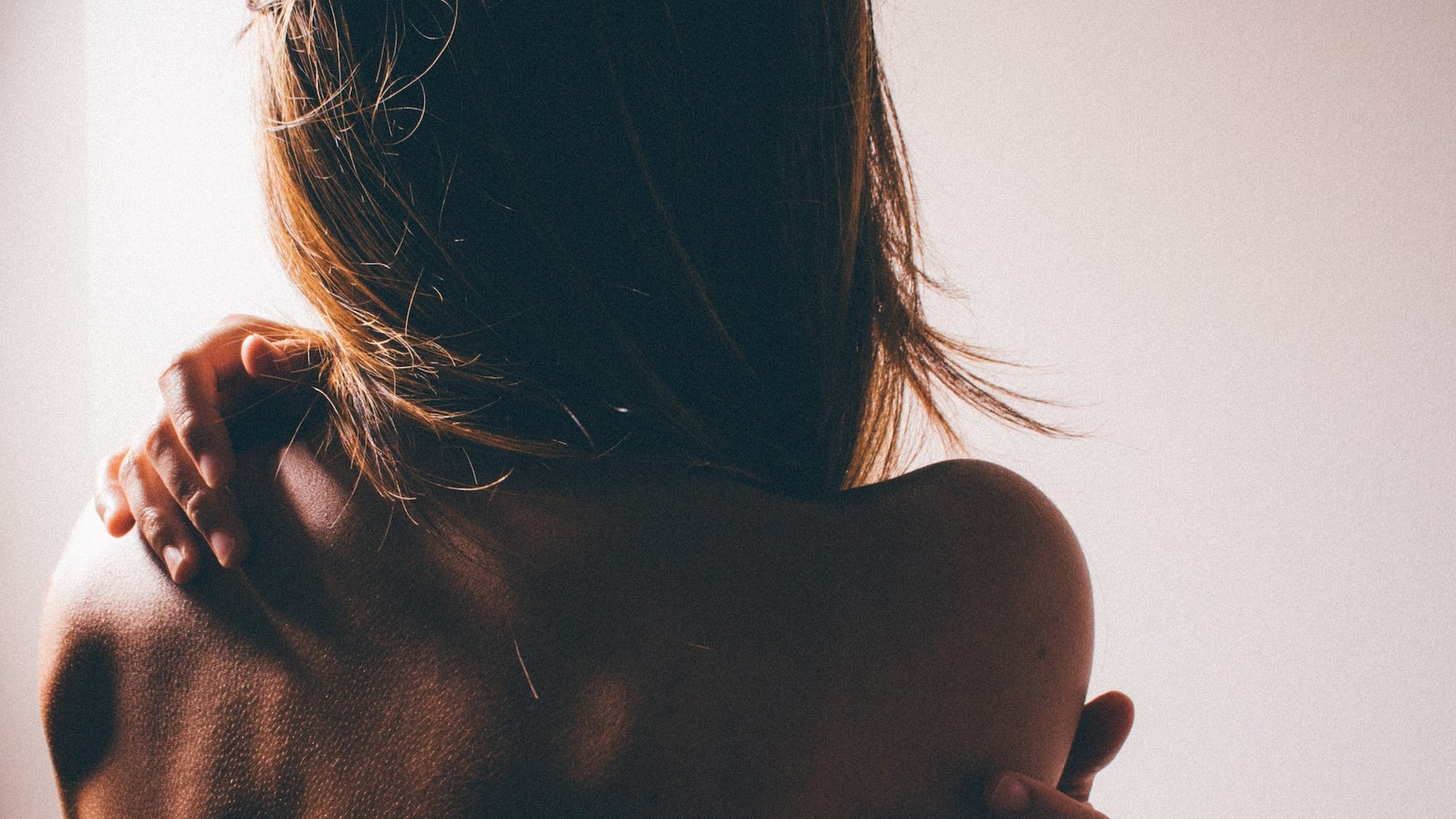A Formulate user who requested to remain anonymous wrote to us with the following question:
I get acne not just on my face, but on my body, particularly on my breasts. It is embarrassing. Is this common, and what causes it? How do I make the clogged pores on my breasts go away?
Thanks for reaching out! To answer your question, we reached out to Dr. Alpana Mohta (MBBS, MD, DNB), a dermatologist, cosmetologist, trichologist, and venereologist.
Causes of clogged pores on breasts
Sebum and bacteria
"One common reason is sebum and bacteria buildup in the area." shares Dr. Mohta. "When sebum and bacteria mix they can create a blockage in the pores and cause them to become clogged."
"If the clogged pores are due to sweat or bacteria, an antibacterial cleanser may also be helpful. Additionally, it's important to keep the area clean and dry, as moisture can further aggravate the problem."
Keeping your skin dry, particularly in summer months, can be tricky. And if you have large breasts, the task is even trickier - the skin immediately under the breasts stays warmer than other areas on the body and gets sweaty easily. These factors make it a particularly hospitable environment for both yeast and bacteria, which thrive in warm, moist habitats.
Fortunately, if you're struggling to keep the skin around your breasts dry due to sweat, there are things you can do to help. Moisture control body powders, like Certain Dri, can help absorb the excess sweat. And if the powder isn't powerful enough, you can apply the prescription strength antiperspirant version under your breasts to prevent the sweat from occurring at all.
Folliculitis (inflamed hair follicles)
Dr. Mohta shares, "Some people develop an inflammation of the hair follicles, called folliculitis, which resembles blocked pores." Spending time in a hot tub, wearing tight-fitting clothes while sweating and exercising, and shaving with a razor are all activities that can prompt folliculitis to develop. These activities throw off the pH levels of your skin and can cause Malassezia yeast to become overgrown, prompting the development of folliculitis. Some types of folliculitis require a trip to the doctor, while other, more mild variations can be treated at home with an over the counter antifungal, or by ceasing the activity that caused the folliculitis to develop.
Though it can be somewhat difficult to tell the difference between folliculitis and acne, folliculitis is typically described as "itchy and painful", compared to acne which is typically just described as "painful." Also, folliculitis is more likely to appear on areas of the body that are covered by tight-fitting clothing, like the breasts, shoulders, buttocks, and back -- it's more common to see folliculitis on the breasts than true acne. Folliculitis also tends to appear in uniform clusters, while acne appears in various shapes and sizes.
If you need to see a doctor for your folliculitis, you might be prescribed an anti-fungal topical cream. Popular anti-fungal creams include Ketoconazole, Butenafine, and Clotrimazole. If topical medications don't do the job, oral medications such as Fluconazole and Itraconazole can serve as a backup. Topical medications are typically prescribed first, as they are less likely to produce unwanted side effects.
Fluctuations in hormone levels
Hormones are different chemicals in your body that carry messages within the body about what the body needs to do. They control many unconscious bodily processes, including your metabolism, your sleep cycle, and your mood. Hormones are powerful messengers within the body, and fluctuations in hormone levels can cause often unwanted side effects. "When hormone levels fluctuate, it can cause the skin to produce more oil than usual, which can lead to clogged pores," says Dr. Mohta. "If the clogged pores are due to hormones, your doctor may be able to prescribe a medication to help regulate hormone levels."
The hormones most associated with clogged pores are estrogen, progesterone, and testosterone, as well as other androgens. Each of these hormones fluctuate throughout the lifespan, but are particularly volatile during puberty, pregnancy, and menopause. They also sometimes fluctuate when someone begins taking birth control pills, particularly if it is a type of pill that contains only progesterone. Progesterone can be especially problematic for the formation of clogged pores, as it can prompt pores to swell shut. This causes sweat, dead skin cells, oils, and pollutants from the environment to be trapped within the skin.
Medications and cosmetics
"Certain medications or cosmetics can also cause the pores to become blocked," says Dr. Mohta. "If the clogged pores are due to cosmetics, it's important to choose products that are non-comedogenic and won't clog the pores." If you're concerned that a medication that you started taking is causing the pores on your breasts to be clogged, it's a good idea to review the information that came with your medication to see if that is a common side effect. Regardless of if your medication is prescribed by a doctor or if it is available over the counter, the distributor of the medication is required by the FDA to provide information with the product that includes common side effects.
It can be tricky to figure out if a cosmetic product is causing the pores on your breasts to become clogged. Though some ingredients and products are believed to be more likely to clog pores than others, there's little solid scientific data around this topic - if you'd like to learn more about this issue, we recommend this article.
It also may be that the product itself isn't causing your pores to become clogged, but that it is instead contributing to the overgrowth of Malassezia yeast, and thus producing folliculitis, the issue discussed above. This is more likely if the product is an antibiotic, or if it causes the area around your breasts to feel oilier than before you used the product.
The best way to find out if a cosmetic product is causing your pores to become clogged is to discontinue that product while changing nothing else about your routine. Give it some time, and see what happens.
Sweating during the summer
Dr. Mohta shares, "Excessive secretion of sweat mixed with dirt and bacteria during hot and humid months of summer can lead to blockage of sweat gland pores. This is especially common in people who go swimming outdoors during summers. Such patients should be advised to take a shower as soon as they are done swimming, in order to avoid the build-up of pore-blocking substances over the skin." Sweat can be problematic for the development of both acne and folliculitis on the breasts. One of the best things you can do to prevent this is to shower quickly when you get home, and to wash all areas that were submerged in water thoroughly with a gentle cleanser.
Hidradentis suppurativa
"There is a chronic skin condition called hidradenitis suppurativa in which there might be the development of blackheads, pustules, and abscesses on breasts (and skin folds like axilla, groin and intergluteal cleft)." Hidradentis suppurativa can cause physical discomfort and scarring due to absysses within the skin that break open and leak pus and blood. It may appear similar to acne, but dermatologists have identified that it is a different type of condition. If you are concerned that you might have hidradentis suppurativa, we recommend reading this article from the American Academy of Dermatology Association.
Caring for clogged pores
In addition to the interventions above, Dr. Mohta also recommends taking the following steps to care for clogged pores on your breasts:
Wash with a Ph balanced soap
"The best way to deal with clogged pores on the breasts is to gently cleanse the area with a bar of mild soap and water. A pH-balanced soap having a pH closer to that of skin (pH of 5.3 to 5.5) is considered ideal. Avoid scrubbing the area too harshly, as this can irritate the skin and make the problem worse. "
Take Cold showers
"If the blockage is in sweat-producing pores, taking cold showers twice a day is advised. Oral vitamin C supplements and the applications of menthol containing creams and calamine lotion are also useful."
Don't wax or pluck hairs
"Patients prone to this skin condition are advised not to wax or pluck the hair over their breasts as it can lead to further inflammation and infection."
Avoid talcum powder
"One common mistake which many patients commit is using talcum powder to relieve their blocked pores. But one must remember that talcum powder particles can further aggravate the skin condition by blocking the pores of the sweat gland themselves."
See a dermatologist
"Depending upon the underlying cause, and the type of blocked pores, your dermatologist might prescribe you a salicylic acid wash or peel (if the blockage is in sebum-producing pores). Other commonly used agents are lactic acid containing topical formulations."
Wanna learn more about the world of skin and hair care? Here's your next read:
Frizzy Curly Hair Care 101
How to defrizz your curls and get 'em back into shape!
Hot Rollers Vs. Curling Irons
What's the difference between hot rollers and curling irons?
Difference Between a Mole and a Freckle
What's the difference between a mole and a freckle?
Moisturizer vs Lotion: What's the difference?
Can you use body lotion on your face?
Tips For Washing Hair In Hard Water
This is your guide to washing your hair in hard water
Minimalist Hair
Welcome to the wonderful world of minimalist hair
Type of Combs: Materials and Shapes
Your complete guide to picking out a comb


